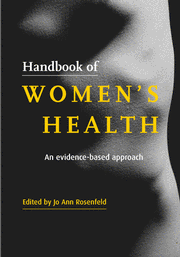Book contents
- Frontmatter
- Contents
- List of contributors
- Common abbreviations used in the text
- Normal blood values in women and during pregnancy
- Introduction
- 1 Singular health care of women
- Preventive care
- Psychosocial health
- Sexuality
- Genitourinary medicine
- Breast disorders
- Psychological disorders
- Common medical problems
- Index
1 - Singular health care of women
Published online by Cambridge University Press: 28 October 2009
- Frontmatter
- Contents
- List of contributors
- Common abbreviations used in the text
- Normal blood values in women and during pregnancy
- Introduction
- 1 Singular health care of women
- Preventive care
- Psychosocial health
- Sexuality
- Genitourinary medicine
- Breast disorders
- Psychological disorders
- Common medical problems
- Index
Summary
The way women's health concerns have been handled, examined, and researched by the medical establishment may be different from that of men. Women's health concerns have been considered different and abnormal when compared with that of men. Yet differences between men and women, noted in medicine and by physicians, may be more creations of society and its expectations than of nature; women are more similar to men than they are diferent.
Research
Exclusion and extension
Researchers have historically assumed that data collected and extended from male subjects, often middle-aged white men, applied to women of all ages (and the elderly) as well. The American Medical Association (AMA) has said “Medical treatments for women are based on a male model, regardless of the fact that women may react differently to treatments than men or that some diseases manifest themselves differently in women than men. The results of medical research on men are generalized to women without sufficient evidence of applicability to women.”
Exclusion: Women, children, ethnic minorities and the elderly have been excluded from research protocols. The justification given for this “is lack of data, but there is also a belief that health iniquities are a smaller problem for women than men.”
For example, research into the acquired immune deficiency syndrome (AIDS) is almost completely androcentric. Until 1993 the US Centers for Disease Control (CDC) failed to recognize different manifestations of human immunodeficiency virus (HIV) infection in women, such as pelvic inflammatory disease (PID), vaginal infections and cervical cancer.
- Type
- Chapter
- Information
- Handbook of Women's HealthAn Evidence-Based Approach, pp. 2 - 12Publisher: Cambridge University PressPrint publication year: 2001



